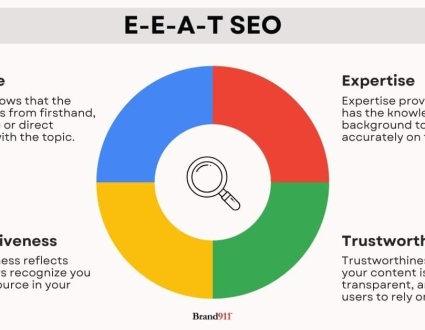
You can offer great service, lead with integrity, and deliver real value—but if your online presence doesn’t reflect that, you’re losing trust before people even reach out.
Today, whenever someone is searching for you or your business, their first stop is Google. And what they see—your reviews, ratings, press, and social presence—shapes how they see you. It’s the starting point for any effort to improve brand reputation.
If your reputation looks weak, outdated, or invisible, they’ll move on.
Reputation marketing changes that.
This guide will show you how to take the positive things people are already saying about you—5-star reviews, testimonials, success stories—and turn them into a marketing engine.
Whether you’re running a business or building your personal brand, reputation marketing helps you show up with credibility, earn trust faster, and win new opportunities before you ever make a pitch.
Why Reputation Marketing Matters Today
People don’t just Google businesses anymore—they Google people. Whether you’re a founder, executive, or local service provider, your online reputation is part of how you do business.
It’s also the foundation you need to build a personal brand that people trust and remember.
Here’s what today’s audience cares about:
- What others are saying about you
- How recently they said it
- How easy it is to find information about you/your business
A single Google search can surface your star rating, recent reviews, press coverage, and social presence—all within seconds. That quick snapshot plays a major role in whether someone reaches out or clicks away.
Some key stats:
- 97% of people say reviews influence buying decisions. (Power Reviews)
- 85% trust online reviews as much as personal recommendations. (Wiser Notify)
- 76% of local purchase journeys begin with a search. (SEMrush)
- 93% of business executives agree that building and maintaining trust improves the bottom line. (PCW)
If your competitors are showing off glowing reviews and you’re not? You’re already behind.
Reputation marketing helps you take control of that first impression. It builds search visibility, earns trust, and gives you an edge—whether you’re trying to attract new customers, land press, close deals, or stand out in a crowded field.

Who Needs Reputation Marketing?
If people are searching for you online, you need reputation marketing to protect your brand.
This strategy isn’t just for big brands or businesses with a national footprint—it’s for anyone whose success depends on trust, credibility, and visibility.
Here’s who benefits most:
Small and Local Businesses
You compete in tight markets where buyers compare options fast.
A visible reputation—strong reviews, updated profiles, social proof—can be the reason someone chooses you over a competitor.
Effective local SEO ties directly into this by helping you appear where customers are searching.
Service-Based Professionals
Consultants, coaches, real estate agents, lawyers, doctors, and other service providers rely on personal trust.
Reputation marketing helps showcase your credibility before a consultation ever happens.
Founders and Executives
As the face of your company, your personal reputation matters just as much as the business.
Strong online visibility builds authority, supports press and partnerships, and helps you lead with confidence.
Online-First Brands
If your business lives online, your reputation is your storefront.
Reviews, testimonials, and case studies are the first proof new visitors see—and they often decide whether someone stays or bounces.
Professionals Building a Personal Brand
Whether you’re growing a platform, applying for speaking opportunities, or launching a new offer—reputation matters.
Learning how to rank for your name can ensure your best content shows up first when people search for you.
A clean, consistent digital presence backed by third-party validation gives your brand weight.
No matter your size or industry, reputation marketing makes you easier to trust, easier to choose, and easier to remember.
Want your name to stand out online? Explore our personal branding services.
How Reputation Marketing Works
Reputation marketing is about turning the trust you’ve already earned into content that works for you—on search, on social, and everywhere people find you online.
At its core, it’s a system for promoting the proof:
- Your best reviews
- Your most loyal customer testimonials
- Positive press or media mentions
- Awards, recognitions, or endorsements
- Social shoutouts and user-generated content
Instead of telling people why you’re great, you show them what others already believe.
You can also highlight reviews and testimonials in your blog posts using SEO-friendly blogging techniques.
Whether you’re a business or personal brand, the process involves:
- Collecting: Ask for reviews when the experience is fresh and positive
- Publishing: Feature that feedback on your website, social media, ads, and more
- Optimizing: Use SEO and structured data so your best content shows up in search
- Amplifying: Turn testimonials into content that builds trust across every touchpoint
- Responding: Engage with reviewers—both positive and negative—to show you care
Think of reputation marketing as your credibility on display. When done right, it becomes a cycle: happy clients leave great feedback → that feedback brings in more clients → the cycle continues.
Real-World Impact: What the Data Shows
Reputation marketing delivers measurable results for both businesses and personal brands.

Whether you’re a local business or a personal brand, a strong online reputation has real-world benefits you can track:
- Increased Click-Through Rates: Businesses with a 5-star rating earn 28% more clicks compared to those with no rating. (Bright Local)
- Higher Conversion Rates: Adding testimonials to a landing page can boost conversions by up to 34%. (Boast)
- Enhanced Pricing Power: 83% of consumers are willing to pay up to 16% more for a superior customer service experience. (Ruby)
- Improved Visibility: Google prioritizes content that demonstrates expertise, authoritativeness, and trustworthiness, including fresh and relevant reviews–read more about how Google ranks results here.
- Attracting Top Talent: Companies with positive reputations attract better candidates. 69% of candidates would actually reject a job offer from a company with a negative reputation–even if they were unemployed at the time. (DSMN8)
Reputation marketing gives you an edge before the conversation even starts. It builds trust without having to “sell” yourself.
And when your competitors aren’t doing it—or doing it poorly—you stand out fast.
Want to strengthen your brand’s authority online? Explore our online PR services.
5 Core Strategies of Reputation Marketing
Reputation marketing is only effective when you actively promote, optimize, and engage with your best feedback.
These core strategies will help you build trust and visibility across every customer touchpoint.
1. Ask for Reviews at the Right Time
Most satisfied customers won’t leave a review unless you ask.
The key is timing. Reach out right after you’ve delivered value—when the customer is happy, the service is fresh, and the experience is top-of-mind.
This could be:
- After a successful project wraps
- Following a service call or appointment
- Immediately after a purchase or delivery
Automate where possible:
- Use review request emails or SMS with direct links
- Include reminders in thank-you messages or follow-up surveys
- Add QR codes to packaging, receipts, or signage in your physical location
Consistency matters. Build it into your workflow, not just during campaigns or special promotions.
2. Promote Testimonials Across All Channels
Don’t let customer reviews sit unused on Google or Yelp—turn them into high-impact marketing content.
Strategically place testimonials where they’ll influence decisions:
- On your website homepage and service pages
- In social media posts, story highlights, and reels
- Inside paid ad copy and visuals
- In email marketing or onboarding sequences
- Embedded in client proposals, pitch decks, or sales slides
Use a mix of formats:
- Text with names and photos
- Star ratings with pull quotes
- Short video testimonials if possible
Let your audience hear from people just like them—past clients, current customers, real people who chose you and got results.
3. Optimize for SEO and Local Search
Search engines love fresh, user-generated content—especially when it’s keyword-rich and relevant. That’s what makes content marketing for SEO vital.
Every review adds valuable content that helps Google understand what you offer and who you serve.
It’s a powerful way to improve search visibility for your name and services.
Reputation marketing helps you:
- Rank higher on Google for your key services and location
- Boost your Google Business Profile performance (especially in map results)
- Earn visibility on third-party sites like Yelp, TripAdvisor, G2, or niche directories
Implement structured data markup on your website (review schema) to highlight testimonials in search results.
If you’re a local business, reviews can be your biggest SEO advantage—especially in competitive markets.
4. Respond to Reviews—Good and Bad
Responding to reviews shows people that you’re engaged, professional, and serious about customer service.
For positive reviews:
- Say thank you
- Mention something specific they shared
- Reinforce the value you provided (“We’re so glad the new onboarding process made a difference!”)
For negative reviews:
- Respond within 24–48 hours
- Stay calm, professional, and open
- Move the conversation offline when needed (offer a direct contact)
- Try to resolve the issue and, if successful, politely ask if they’d consider updating their review
Responding doesn’t just help the reviewer—it signals to future customers that you care and take feedback seriously.
5. Use Social Proof to Drive Conversions
Social proof isn’t just about building trust—it’s about removing doubt.
Use quotes and testimonials in places where people hesitate:
- Near pricing sections or buy buttons
- Inside email nurture sequences
- On landing pages tied to paid ads
- In retargeting campaigns
You can also:
- Highlight success stories with similar clients
- Show “before and after” results
- Add a “What Our Clients Are Saying” section to your website navigation or footer
Even a single review with the right message—“I was skeptical at first, but…”—can turn a hesitant lead into a paying customer.

How Reputation Marketing Builds Long-Term Growth
Most marketing campaigns have a short shelf life. A great ad or email might work for a few weeks—then it’s time to start over.
Reputation marketing is different.
It builds value over time. Every new review, testimonial, or article adds another layer of trust to your brand—making your future marketing more effective and more believable.
Here’s how it creates compounding growth:
You Earn More Trust, Faster
People don’t just want to know what you do—they want to know if others trust you.
When your reputation is clearly visible, leads convert faster because they already feel confident.
You Lower Your Customer Acquisition Costs
Reviews and testimonials increase your conversion rates across every channel.
That means less spend on paid ads, more results from organic traffic, and better ROI from every campaign.
You Build Resilience Against Bad Press or Negative Content
Even great businesses get the occasional bad review or unfair headline.
But when you’ve already built a strong, visible reputation, one negative link won’t define you. You have enough social proof to outweigh it.
Keep your best content working for you—optimize it for better visibility and conversions.
You Attract Better Talent
Your reputation doesn’t just influence customers—it shapes how potential employees see you.
People want to work for businesses and leaders who are respected and appreciated. A strong reputation helps you compete for top candidates.
You Create a Reputation Flywheel
Happy customers leave reviews → Reviews attract more customers → More customers leave reviews.
This feedback loop strengthens your brand over time and keeps your momentum going—even when you’re not actively promoting.
Done right, reputation marketing becomes one of the most cost-effective, long-term strategies for business growth.
You’re not just telling people you’re great—you’re proving it, consistently.
Common Misconceptions About Reputation Marketing
Reputation marketing is often misunderstood. Some think it’s just about getting reviews. Others confuse it with crisis management. These assumptions hold people back from using it to its full potential.
Let’s clear up a few common myths:
“It’s only for businesses with bad press.”
Reputation marketing isn’t damage control—it’s a growth strategy.
Even if your reputation is already strong, you still need to promote it. If no one sees your 5-star reviews or press mentions, they don’t help you win new business.
“It’s the same as reputation management.”
Reputation management is about repairing your image when something goes wrong.
Reputation marketing is about building visibility before that happens. It focuses on amplifying the good and protecting you from the bad.
“It’s just a review collection strategy.”
Getting reviews is only the first step.
Reputation marketing is about what you do with those reviews—publishing them, turning them into content, improving SEO, and using them to drive conversions.
“It’s only for big brands or online businesses.”
Local service providers, solo consultants, and small business owners benefit just as much—sometimes more.
When people are comparing options in your area or niche, a visible reputation can instantly tip the decision in your favor.
“It’s a one-time setup.”
Reputation marketing isn’t a one-and-done task. It requires ongoing attention:
- New reviews
- Updated testimonials
- Regular content promotion
- Consistent responses
Treat it like any other key part of your marketing strategy—something that grows with your brand over time.
FAQs About Reputation Marketing
Have questions? You’re not alone. Here are answers to the most common things we hear from clients.
What’s the difference between reputation marketing and reputation management?
Reputation marketing is proactive. It focuses on promoting positive reviews, testimonials, and content that builds trust.
Reputation management is reactive. It addresses negative content, bad press, or outdated search results.
They work best together: one builds positive visibility, the other protects it.
How many reviews do I need before I start promoting them?
You don’t need hundreds. Start with 5–10 strong, authentic reviews and build from there.
Even a few high-quality testimonials—if recent, detailed, and relevant—can boost trust and conversions when promoted well.
Do I need to be on every review site?
No. Focus on where your customers actually look:
- Google for most local and general businesses
- Yelp for restaurants and services
- G2, Capterra, Trustpilot for SaaS or tech
- LinkedIn or personal websites for professionals
Pick 2–3 key platforms and maintain them consistently.
Can reputation marketing help with search rankings?
Yes. Fresh reviews and testimonial content add keyword-rich, user-generated content that Google rewards.
Plus, building your Google Business Profile and review volume directly impacts local search visibility.
How long does it take to see results?
You can start seeing traction in a few weeks—especially if you’re actively collecting and sharing reviews.
Long-term growth compounds over months as your reputation becomes stronger and more visible across search and social.
Conclusion: Turn Your Reputation Into Results
Your reputation is more than a reflection of your past—it’s a tool for growing your future.
Reputation marketing gives you a way to take control of how people see you online, using real feedback to build trust, attract new business, and stand out in a crowded space.
Whether you’re a business owner or building your personal brand, reputation marketing helps you show up the right way—consistently, credibly, and confidently.
Key takeaways:
- People trust online reviews as much as personal recommendations
- A strong reputation directly impacts clicks, conversions, and revenue
- Promoting positive content is just as important as collecting it
- Responding to feedback shows professionalism and care
- Your reputation can drive long-term growth when managed strategically
Promoting your best content can also help you increase blog traffic and expand your audience even further.
Ready to start building visibility with credibility?
Brand911 helps businesses and professionals turn their best feedback into their most effective marketing tool.
Schedule a free consultation to take control of what shows up when people search your name.
About us and this blog
We are a digital marketing company with a focus on helping our customers achieve great results across several key areas.
Request a free quote
We offer professional SEO services that help websites increase their organic search score drastically in order to compete for the highest rankings even when it comes to highly competitive keywords.
Subscribe to our newsletter!
More from our blog
See all postsRecent Posts
- What is an SEO Strategy? January 8, 2026
- What Is Digital PR? A Practical Guide to Building Trust Online January 6, 2026
- How to Do a Content Gap Analysis December 30, 2025















Recent Comments